A family-owned business means a business started by two or more family members—it can be the web design business you start with your cousin or the jewelry-making business you run with your husband. Many families see it as a way to create generational wealth and security, but it can also bring you closer together as you follow your passions and make money at it too.
Any business—even an accounting firm—can become a family business. However, if you’re just starting out and need some ideas, we’ve pulled up 19 of the best family business ideas to start for 2024.
Did you know? Over 87% of businesses in the US are family-owned or controlled. That ranges from Fortune 500 companies like Walmart to the Chinese restaurant down the block. Family-owned businesses make up 70% of the global gross domestic product (GDP) and 60% of global employment.
Family Businesses in Food
1. Family Restaurant
Restaurants are the classic family business. From preparing food to serving to back-office administration, there are so many ways a family member can contribute. You can feature recipes from your family traditions or cultural heritage or do something completely different—whatever your passions and the market can support. This is a good time to start a restaurant as the National Restaurant Association says sales are expected to top $1 trillion in 2024.

Family-owned restaurants often feature family recipes or cultural dishes. (Source: Pixabay)
There are over 749,000 restaurants in the US, with over 138,500 independently owned and single locations. However, many very popular national and multinational restaurant chains started as family-owned businesses. These include Chick-fil-A, Panda Express, Denny’s, First Watch, In-N-Out Burger, and Shari’s Cafe and Pies.
- Challenges: High competition, high failure rate, long hours, high stress
- Advantages: A great outlet to showcase your love of food, meet a variety of people, and provide a community gathering place
- Required resources/skills: You’ll need cooking and administrative skills. Your cooking staff will need food safety certifications, and, of course, you’ll need a physical restaurant location.
One staple of restaurants is a good point-of-sale (POS) system. We recommend Toast as our best overall restaurant POS system, and Square for the best no-cost system. Check out our restaurant POS buyer’s guide for other great choices.
2. Food Truck
If starting a family restaurant is too expensive or requires too much commitment, then a food truck is a cheaper and simpler alternative. It’s also a good family business because you only need two people. The other fun thing about food trucks is you don’t have to have the same menu all the time; use it to preserve Grandma’s recipes or to mix it up with some of your own.
Food trucks can earn between $250,000 and $500,000 yearly. Trucks cost $30,000–$200,000, and startup costs range between $40,000 and $200,000.

The Big Pig food truck works nine months out of the year. (Source: KSNB on YouTube)
Matt and Amy Sneezy purchased The Big Pig food truck, then changed up the cuisine. They work nine months out of the year, and during busy times, their kids come to help. Matt said he enjoys bringing the cuisine he experienced in his youth to the Hastings, Nebraska, area.
- Challenges: Logistics, finding a good location, poor weather, restrictive local ordinances
- Advantages: Easy to expand, change cuisine, travel, limited menu, few employees
- Required resources/skills: You’ll need to own or rent a truck and obtain food and fire safety certifications. You also need cooking skills, unique menu, POS system, food truck, and ingredients.
3. Catering
Like food trucks, catering is a family-friendly alternative to owning a full restaurant. You can run the core of the business with family members and hire temporary workers for events. It can cost between $5,000 and $40,000 to start a catering business—cheaper than even a food truck—and has profit margins as high as 25%.
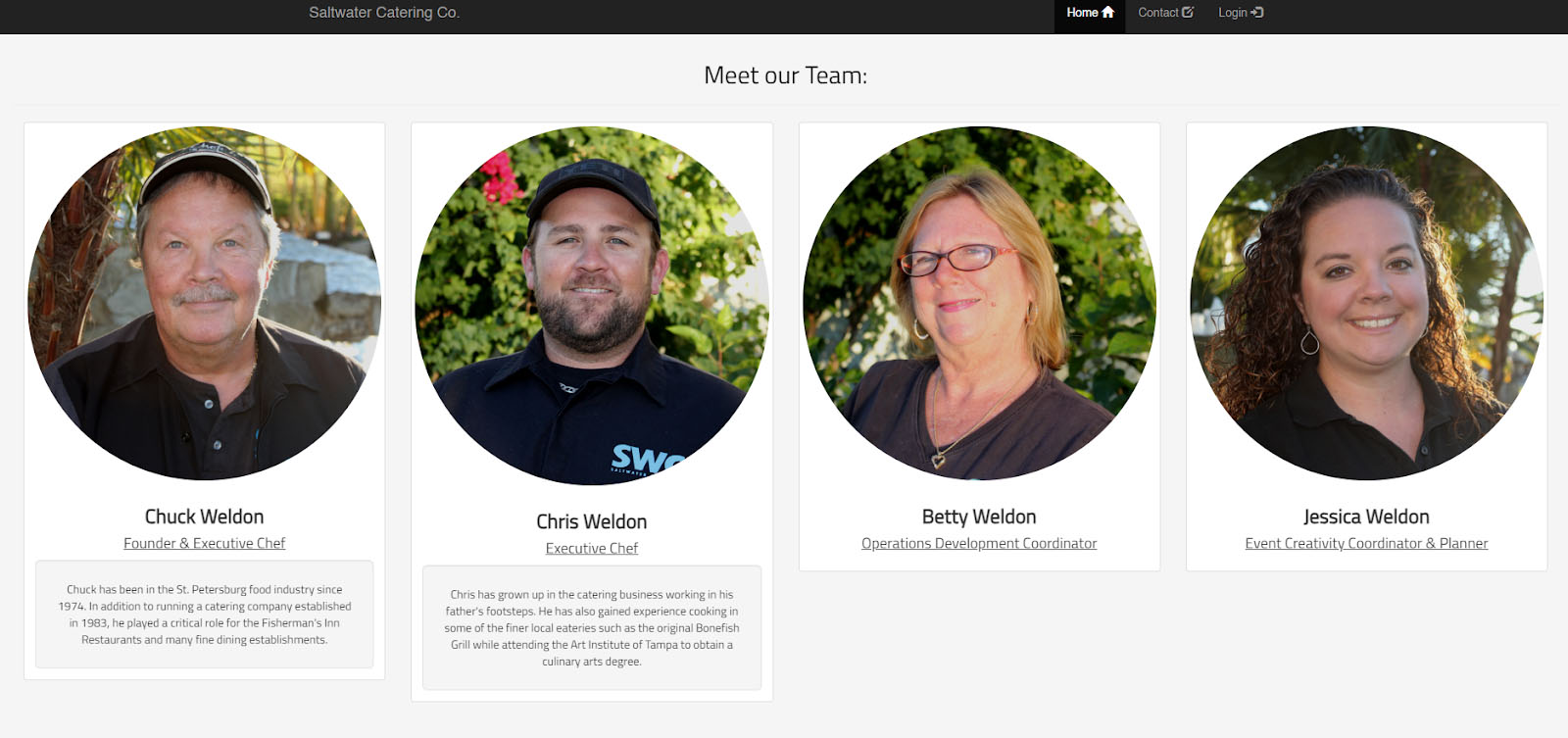
The Saltwater Catering Co. of Tampa, Florida, has a father-son chef duo. (Source: Saltwater Catering Co.)
The Saltwater Catering Co. is run by the Weldon family, with Chuck Weldon and his son as the executive chefs. Chris grew up in the catering business working with his father, then also gained outside experience in restaurants and at the Art Institute of Tampa. Now, they cater to events and schools.
- Challenges: Fluctuating demand, challenging clients, high pressure, tight deadlines
- Advantages: Low overhead, high profit margins, the satisfaction of being part of someone’s special event
- Required resources/skills: Cooking and serving, possibly even tables, chairs, and event tents, transportation, licenses, insurance, permits
4. Microbrewery or Winery
If you have a love for craft beers or designer wines that you want to share with future generations, this can be a good business to consider. There’s so much family members of any age can help with. Even younger kids can start early by learning how to grow the grapes, choose the hops, or clean the equipment. And even if someone isn’t into beer or wine, there’s still the business and sales sides.
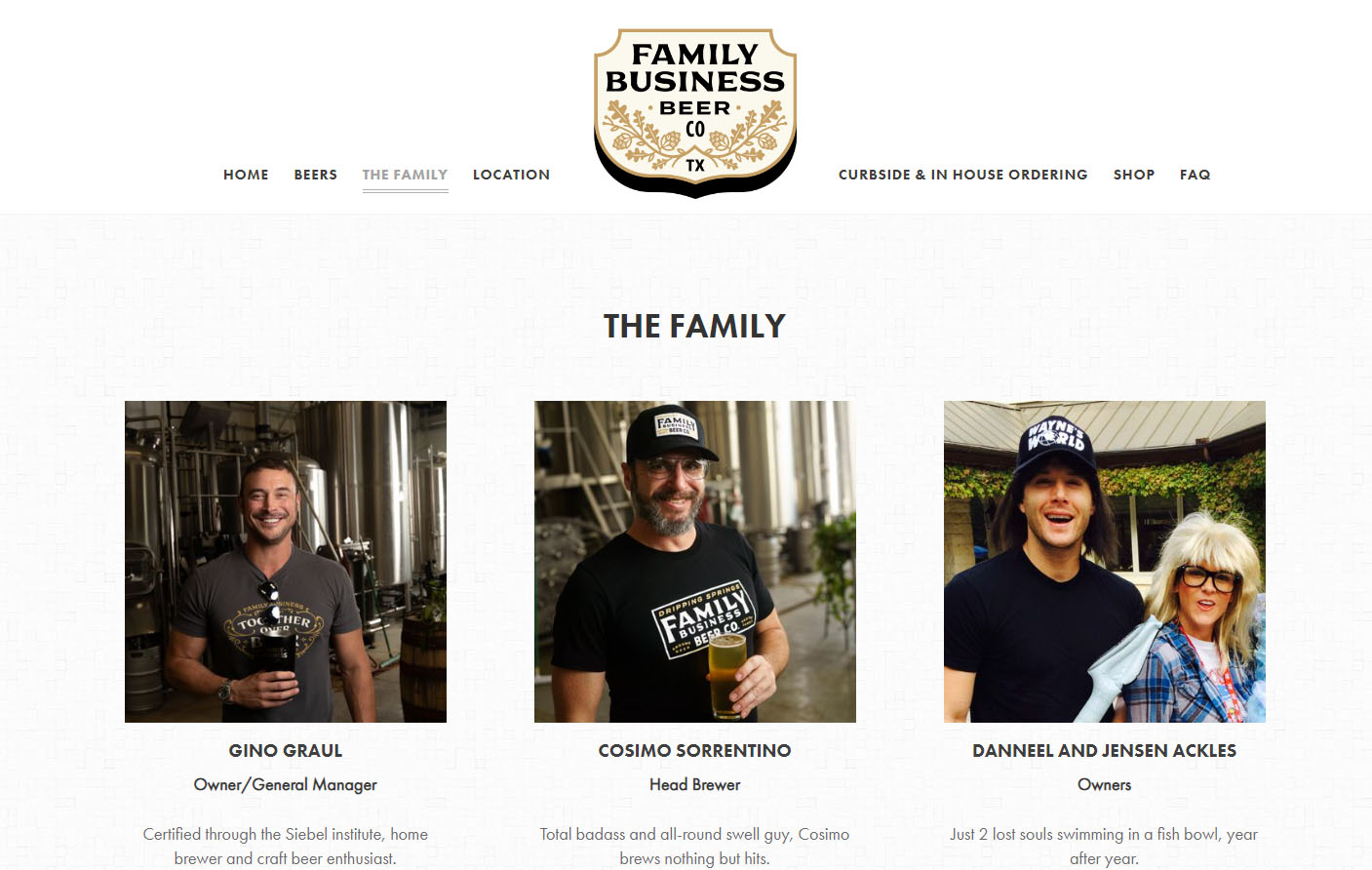
Family Business Beer is, unsurprisingly, family-owned. (Source: Family Business Beer)
Opened in 2018 by Gino Graul, Jensen Ackles, and Danneel Ackles, the Family Business Beer Company of Dripping Springs, Texas, sits on the family’s 15 acres of land. In addition to the brewery, they now sell their beers at Whole Foods, HEB, and other stores.
- Challenges: Cleaning the equipment, liabilities, competitive market, 24/7 attention needed, data- and methodology-heavy
- Advantages: Crafting beer, formal education not needed, can be meditative
- Required resources/skills: Knowledge of home brewing, brewery equipment, licensing, liability, distribution
Family Businesses in Retail
5. Small Store
My mother often spoke fondly of the small candy store her father started next to their home. It became the popular gathering place for the schoolkids—and her mother could always get a candy bar when she had a sweet tooth.
Retail is always a risky endeavor, but family-run stores have advantages popular department stores can’t match. Consumers like the personal touch and the feeling of supporting local businesses. You can promote a sense of community and have more flexibility in products. There are a lot of roles for family members to fulfill from finding and purchasing products to working with customers to taking care of scheduling, budgets, and other administrative tasks.

Family-run stores can sell anything, from books to groceries. Research your market and start from your family’s interests. (Source: Pixabay)
Many family-owned stores grew into national and international corporations. These include Walmart, Aldi, the McRoskey Mattress Company, and Whole Foods.
- Challenges: Retail is a tricky market; potentially high starting cost
- Advantages: Work with people, lots of low-skill and skilled work needed (good opportunities for all family members)
- Required resources/skills: Marketing, accounting/budgeting, sales. Good location, products, POS system
Learn more in our article on starting a retail business.
6. Jewelry Making or Crafts
Jewelry making can be a nice side business or a full-time occupation. Whether you are crafting costume jewelry or starting a diamond store, it requires creativity and an eye for beauty and style. The ROI depends heavily on your ability to appeal to your audience’s aesthetics and market to them. Many successful jewelers are family-run businesses because it’s something that can be mentored.
See our guides to starting a jewelry business and jewelry marketing ideas.

Kerrie and Roy Lapoehn sell their handcrafted jewelry online and at events. (Source: Akrylicpourn on Instagram)
In 2022, Kerrie and Roy Lapoehn started an acrylic arts and jewelry business, Akrylicpourn. They pour the acrylics in their basement and sell the products at craft shows and festivals around Northern Colorado. Kerrie recently said that she can’t believe how they have grown both as business owners and as a couple.
- Challenges: Can take a long time to be profitable, niche market, income not guaranteed, jewelry is easy to shoplift
- Advantages: Creative outlet, full control of the design, don’t need a storefront, chance to travel to festivals
- Required resources/skills: Artistic skills, steady hands, sales, jewelry-making equipment, tent, table, display cases
Regardless of the size of your store, a good POS system can help you process and track sales. We recommend Square POS because it’s free for the basic system but can grow with your business. For ecommerce, consider Shopify, which provides an online store as well as an in-person POS system.
7. Ecommerce
Like retail, the possibilities for ecommerce are wide-open: dropshipping, product sales, e-products or online services, and more. Because it’s online, you can run the sales and marketing completely from home or on the go. It’s great for families that travel. It’s a booming industry, with online sales topping $1 trillion in 2022 and expected to make up 25% of global retail by 2026. If your in-person family business is floundering, it could be the way to up sales.

Ecommerce is growing in popularity for its convenience and ease of use. (Source: Bean & Bean Coffee Roasters)
Bean & Bean is run by Rachel and Jiyoon Han. In addition to four on-site locations, it offers coffee subscriptions and one-time sales of coffee, teas, matcha, and gifts. Both are Q Arabica Graders (aka, the sommeliers of coffee), and source organic and fair trade coffees exclusively.
- Challenges: High competition, not guaranteed income, technology can be fickle, shipping takes time and money
- Advantages: International reach, low starting costs, 24/7 sales potential, run the store anywhere
- Required resources/skills: Programming, online and social media marketing, ecommerce software
Search our site for articles on ecommerce, including how to start an online store and the best ecommerce platforms to run it.
8. Real Estate
Real estate can be a great family business, but it depends heavily on maintaining a good professional relationship and customer focus. According to ZipRecuiter, real estate agents earn an average of $85,793, while brokers earn $98,791. Of course, this depends on the market and your ability to sell.

The Keyes Company real estate agency is in its fourth generation of leadership. (Source: The Keyes Company)
The Keyes Company has been providing real estate services in Florida for four generations. Its latest president, Christina Pappas, says that honoring her grandfather’s legacy and working alongside her father is more than she could have dreamed. The Keyes Company has 4,000 realtors in 50 offices throughout Florida.
- Challenges: Depends on the market, not a steady income, odd hours
- Advantages: Schedule flexibility, potential for high profit in a short time, meet a variety of people
- Required resources/skills: People skills, ability to understand what a client wants, sales acumen, real estate license, transportation
9. Vintage Clothing Business
If you’re into fashion, this is a fun multi-generational business. Even great-grandma can participate in an advisory role. This business works as an online store or a physical one. You can create your own designs or shop thrift stores for awesome finds. Vintage clothing is growing in demand. Future Market Insights says that the secondhand apparel market is expected to grow from $43.49 billion in 2024 to $125.18 billion by 2034—a CAGR of 11.1%.
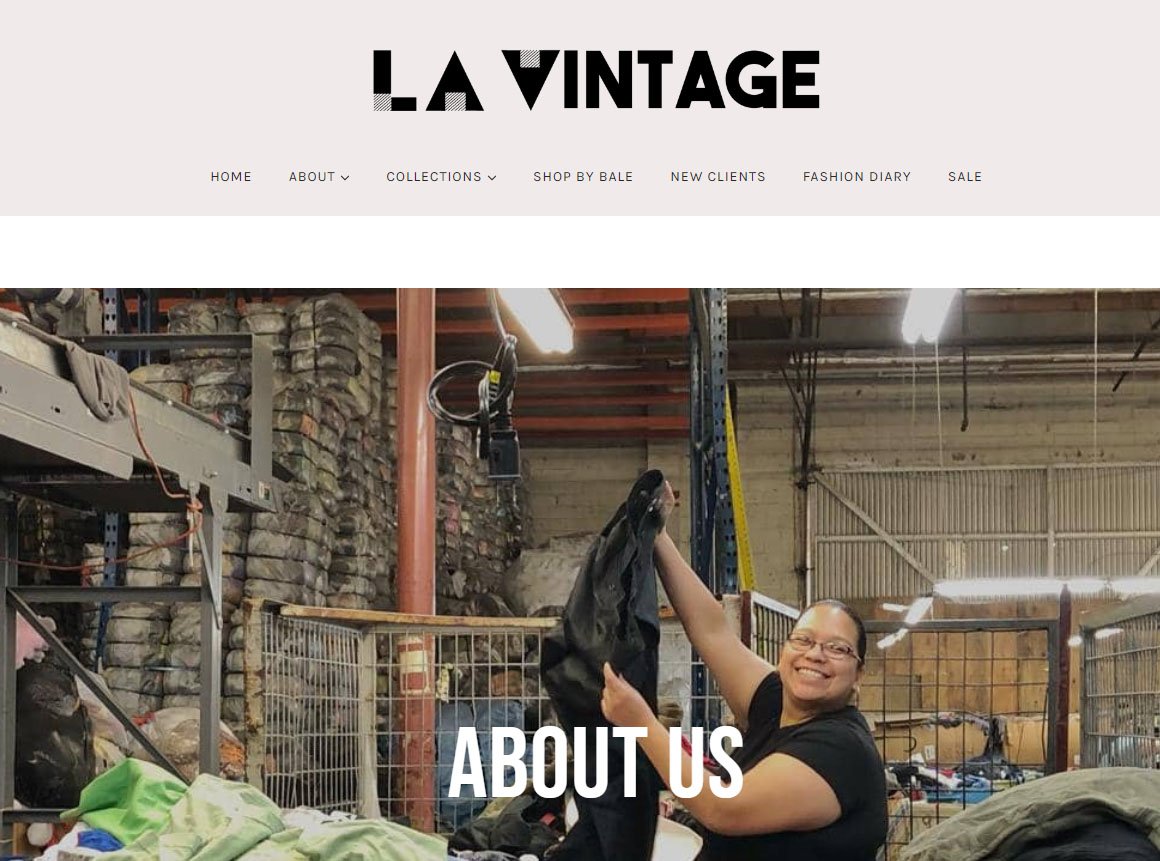
LA Vintage is a wholesaler of second-hand vintage clothes from the 1940s to the 2000s. (Source: LA Vintage)
LA Vintage is a family-owned business that recycles used clothing, shoes, and accessories. It was started in the 90s with the goal of “reuse, recycle, reduce.” As a wholesaler, their primary market is retail stores in third-world countries. They have a 42,000-square-foot warehouse and take bulk orders in-person and online.
- Challenges: Need a good supply of stock, at the mercy of trends even with old fashion, fluctuating demand
- Advantages: Unique catalog, helping the environment by removing waste, doesn’t need a physical store, fun discovering “new” products
- Required resources/skills: Eye for fashion, sewing skills for repairs or creating new clothes, sales, computer skills, online store or website
Find tips in our guide to starting a consignment shop.
10. Family Farm
Farming is the original family business, but it’s no longer just about tending the land. Even someone interested in technology, computers, and online marketing can contribute. Farm life can go a long way toward teaching children about responsibility, survival, and the circle of life. Despite the cliche, family farms are generally profitable. The U.S. Department of Agriculture (USDA) predicts that the median farm household income will be $99,445 in 2024.

The Orlando Family Farm uses vlogging as part of its marketing. (Source: Orlando’s Family Farm)
The Orlandos were a military family for 13 years before settling down to start their own farm. Their goal is to live a natural and sustainable lifestyle. They grow their own food and other plants to make products for bath, body, and home that they sell on their website and at local events.
- Challenges: On duty 24/7, especially with animals; at the mercy of weather; physically demanding; need technical as well as traditional farming skills to succeed
- Advantages: Healthy lifestyle, grow your own food, great for the environment, joy of being out in nature
- Required resources/skills: Green thumb, agricultural and animal husbandry knowledge, farming equipment, tools for making products, sales acumen
Find the most profitable farm ideas in our article.
Family Businesses in Skills & Services
11. College Consulting
College consultants provide guidance and services to families for choosing and applying to colleges, scholarships, and financial aid. If you have kids, this has the advantage of giving you a head start for their own college adventure. According to IBIS World, this industry has been growing at a CAGR of 0.8% over the past five years and is expected to continue to grow.

College consultants help families secure higher education for their kids. (Source: Pixabay)
Core College Counseling is a family-run college consultancy that guides you through the admissions process. It was founded by Shannon Bergeron, who is CEO. Norm Bergeron is the music specialist, and Sam Bergeron specializes in essays. They charge $400 an hour and have packages from $3,000 to $10,900.
- Challenges: Seasonal highs and lows, lots of competition, families depend on you to be an expert on a huge number of colleges, dealing with bureaucratic paperwork
- Advantages: Apply what you learn about the system for your own family, inexpensive to start, highly rewarding, control over your workload
- Required resources/skills: Writing, working through complicated (and sometimes confusing) college and government websites, heavy people skills, research; knowledge of the financial aid process, where to find scholarships, etc.
12. Housekeeping
If you and those you love are neat freaks, then share that unique and much-valued talent with others—and make some good money doing it. Housekeeping is a growing business, and ZipRecruiter says the owner of a cleaning business makes an average of $127,973 yearly. If you are good with extra-yuck, there are specialty services like crime scene cleanup that are even more lucrative.

Tina Maids of Palm Springs is a family-owned housekeeping service turned franchise. (Source: Tina Maids)
You don’t have to be a housekeeper to start a housekeeping business. William Geronco had a computer programming and marketing background while his wife, Christina, was a business manager. They started their cleaning company, Tina Maids, by applying technology to provide better quality cleaning. They now have franchises across the US.
- Challenges: Working together on other people’s homes, then going home to clean your own
- Advantages: Low startup cost, no real training needed for general housekeeping
- Required resources/skills: Cleaning, specialty training for specific cases (hoarders, crime scene), cleaning supplies, transportation, licensing, liability insurance
13. Home Repair
It used to be that many of us learned how to fix a sink or repair a broken porch by watching our parents. Now, many of us resort to YouTube or call a handyman. If you love to fix things and want to pass that on, this could be the best family business to start. Profit margins run 15% to 50% depending on the job and area, according to Zenbusiness.com.
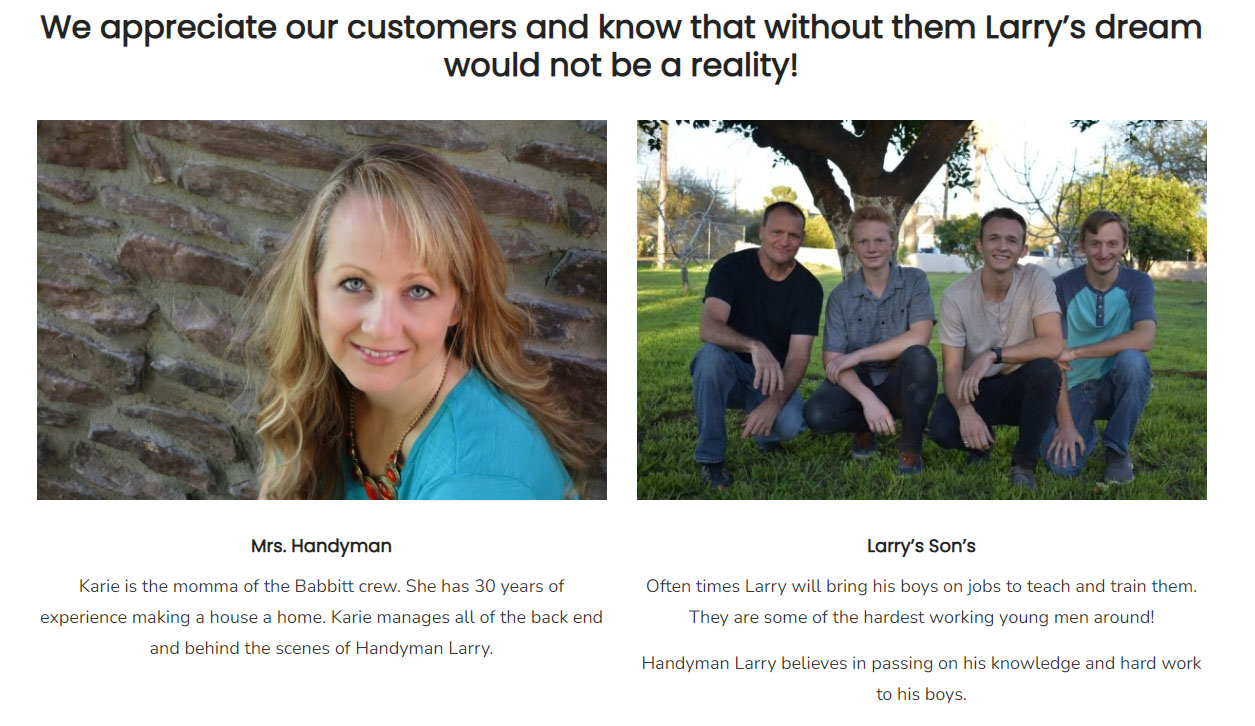
Handyman Larry started his business with an eye for teaching his sons. (Source: Handyman Larry)
Handyman Larry owner, Larry Babbitt, has been doing construction, cabinetry, and other home improvements since he could hold a shovel. He learned from his father and said one of the reasons he started his own business was to pursue his passion and have an avenue to teach his boys.
- Challenges: Seasonal fluctuations, physically demanding, chance of injury, may lose money if behind schedule, demanding clients
- Advantages: Work with your hands, creativity, satisfaction of creating something people will live in and use, low startup costs, potential high profits
- Required resources/skills: Tools, transportation, licensing, liability insurance, certifications for specialties (HVAC, electric)
14. Pet Sitting
Pet sitting is a growing industry expected to grow at an annual CAGR of 7.5% to $6.81 billion by 2032. This is a good choice for families who love animals because you can set your own schedule. You can also choose your level of involvement, from pet training and vacation kenneling in your home to virtual pet sitting.

Pals for Paws is run by a married couple and hires other dog walkers. (Source: Pals for Paws)
Pals for Paws is a dog walking and pet-sitting service founded by Aaron and Rebecca Dirks, both graduates of the University of Iowa class of 2007. They also employ three full-time and two part-time dog walkers and serve Iowa City and several towns.
- Challenges: Chance of being bitten, need to watch small children around strangers’ animals, work demand fluctuates
- Advantages: Get to meet a lot of new animals (and people), set your own schedule
- Required resources/skills: Transportation, pet supplies, liability insurance
15. Laundromat
A laundromat can be a good choice for young couples because, depending on the space, you can keep your kids with you, saving childcare costs. Plus, it requires minimal supervision, making for a more flexible and relaxed family schedule. It’s also a steady business with a good ROI—up to 35% in the first year, according to Laundrylux.

Sudsville Laundry offers 24/7 laundromats in Maryland. (Source: Sudsville Laundry)
Sudsville Laundry is a chain of coin-operated laundromats in Maryland. It’s been a family-owned business since 1958 and has grown to 18 locations all providing 24/7 year-round laundry service. They are now expanding into car washes.
- Challenges: Irregular hours, large initial investment, hard to control who comes in (and lingers)
- Advantages: Strong ROI, minimal employees, good professional community
- Required resources/skills: Business acumen, some knowledge of plumbing, electrical, liability insurance, laundromat
16. Moving Company
A family-run moving company has great marketability. It promotes a sense of trust (“Our family will take care of your family”). You need family members who are strong as well as those who will pay attention to the details of packing and keeping customers reassured. IBISWorld says that the average income per task is $500–$2,000 with an average profit margin of 4.3%.
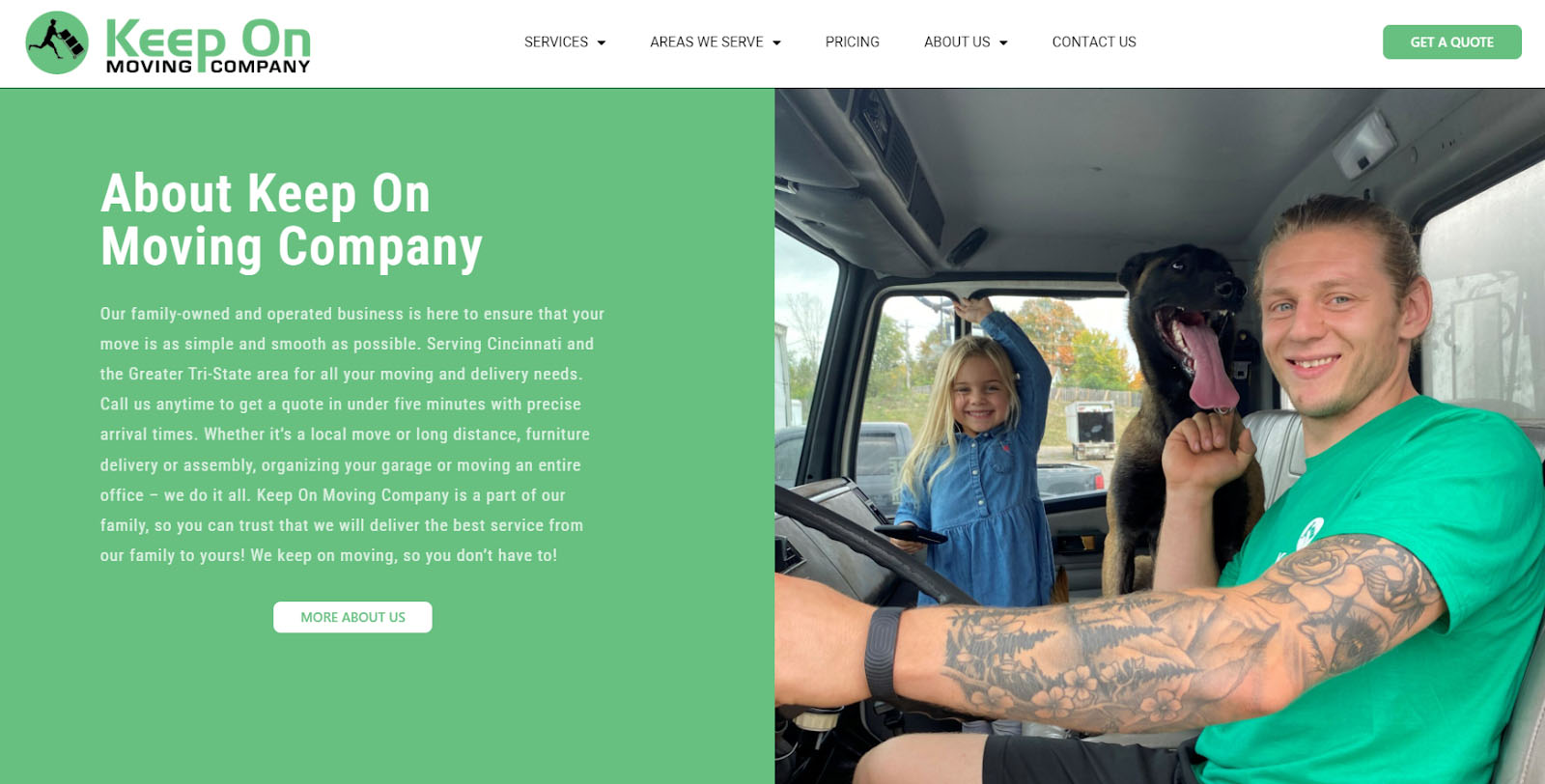
The Keep On Moving Company uses its family-owned status in its marketing. (Source: Keep On Moving)
The Keep On Moving Company of Cincinnati, Ohio, serves the Greater Tri-State area. It says in its blog, “…you can expect personalized attention from start to finish throughout the entire moving process. Unlike big-box companies, which are focused on completing as many moves as quickly as possible, family-owned businesses take pride in providing quality services for each individual customer.”
- Challenges: Highly physical work, legal and regulatory requirements, competition, lots of driving, potentially a lot of time on the road away from family
- Advantages: Meet interesting people, see people’s homes, travel, simple business model
- Required resources/skills: Strength, attention to detail, driving skills, packing materials, truck, liability, commercial driver’s license (CDL)
17. Wedding & Event Planners
Event planning is a popular and fun business, and it can be great for a family because it needs many skills: organization, graphic arts, working with people, budgeting, decorating, even cooking if you add a catering arm. Event planning is also a nice side business for picturesque family farms. StartEazy says event management companies make a profit margin of 10% to 30%.

KB Events is a family-owned event planning business in Santa Barbara, California. (Source: KB Events)
Katie and Adam Schutte married in 2008. Katie was already an event planner with the Four Seasons Biltmore, and in 2015, she and her husband started their own event business. Adam says, “No profession has brought me more joy than coordinating weddings with my wife.” They share their journey as a couple and as event organizers on their website.
- Challenges: Bridezillas, high pressure and tight deadlines, long hours, competitive market
- Advantages: Low startup costs, can meet a variety of people, helping people celebrate important days in their lives, high ROI, short contract work, fun
- Required resources/skills: Organization, networking, decor, graphic design, scheduling, people skills
18. Teaching or Tutoring
If you are good at helping your kids with math, then a teaching or tutoring business might be good for you. Freelance teaching is a growing business, with opportunities in home schooling co-ops, teaching platforms like Teachable, and the need for personal tutoring at all grade levels.

Score At The Top was started as a home business and has grown to multiple locations. (Source: Score At The Top)
Judi Allen started her tutoring services in her home, growing until she had to hire other tutors to help students prepare for the SATs. When they moved to Florida, her husband encouraged her to open a center in Vero Beach. Score At The Top has grown with demand to provide several locations throughout Florida.
- Challenges: Uncooperative students, seasonal work, competition with school programs, may have to work when clients are available (evenings)
- Advantages: Watching a student light up when they understand something, setting your own hours, low startup costs, always in demand, can take summers off
- Required resources/skills: Knowledge of the subjects you teach, people/children skills, patience, teaching supplies, teaching or webinar platform for online teaching
19. YouTube
Does your family have a flare for the dramatic or the humorous? YouTube (or podcasting or vlogging) does not guarantee income—it takes time, consistency, and luck—but it can be a lot of fun as a side hustle. You make your money based on popularity; as you gain followers, you can monetize your site with advertising and sponsorships. Others sell merch or even ask for donations. Even if you don’t make money, you will make memories.

A YouTube business can be fun, but it’s also a lot of work and marketing. (Source: Holdernessfamily.com)
The Holderness Family is a great—and fun!—example of how this works when it really works. Kim and Penn Holderness started in 2013 when their Christmas card video went viral and now have over 5 million subscribers, plus they sell merch. Penn Holderness sings and writes songs and acts with Kim. They have also involved their children and some friends.
- Challenges: Difficult to break into, takes talent and/or a unique angle, plus strong marketing skills
- Advantages: Can be a lot of fun, family bonding, highly creative
- Required resources/skills: Talent, imagination, tenacity; video editing, social media and other online marketing; camera, video editing software, good quality mic
Still not sure what business to start? Check out our list of other great starter businesses:
Frequently Asked Questions (FAQs)
These are some of the most common questions we encounter about starting a family business.
When starting a family business, you need to consider more than just the basic steps for starting a business. You want to maintain good relationships with your family members, so start with some ground rules on roles and expectations, including how to approach each other with difficult issues. You should also establish a clear chain of authority as well as succession planning.
The three types of family businesses are:
- Solely-owned: This business has one owner, and it is passed on to one family member, usually parent to child.
- Sibling ownership: In this case, two or more siblings each have a share of the business and split the responsibility, risk, and profits.
- Family dynasty/diffuse ownership: Here, ownership extends beyond the nuclear family to include aunts, uncles, or cousins
An LLC or partnership can provide liability protection without the administrative requirements needed for a C corporation.
According to Harvard Business Review, 70% of family businesses fail or are sold before the second generation takes them on. Selling the business could, of course, count as a success.
The most obvious one is that the family members disagree on how the business is run, and the conflict bleeds over into their home life—or vice-versa, where family roles make it hard for them to work together. (A daughter may not want to stand up to her dad.) Other issues include:
- The CEO stays in power for decades, making it harder to change with the times.
- Children resent being obligated to continue the family business.
- Children of successful companies treat the business as their fallback plan.
- The business can’t grow fast enough to support the family.
- Children follow their parents’ footsteps too closely, specializing to the point that they can’t adapt to change.
Bottom Line
Family businesses are vital to the economy, providing employment not just for family members but for others as well. Any business can become a family business—however, the best family business ideas are not only lucrative but allow the family to grow closer while securing financial security for generations. If you’re just starting out, the 19 ideas we presented are both popular for 2024 and have been successful for other families.
